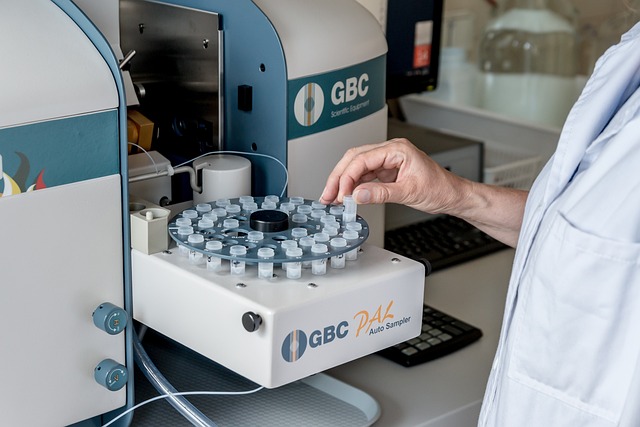Vitamin B12 deficiency, often overlooked but serious, is a growing concern in the UK, primarily affecting vegans/vegetarians and the elderly. Early detection through the advanced Thyroid Blood Test, which checks B12 levels, homocysteine, and folate, is key. Treatment involves dietary changes, supplements (oral or intramuscular), and regular monitoring for at-risk groups. Awareness of symptoms and regular blood tests are crucial for prevention and managing deficiency's health risks.
In the UK, vitamin B12 deficiency is a growing concern, impacting both young and older adults. Understanding this condition is crucial for maintaining overall health. This comprehensive guide delves into the world of advanced thyroid blood tests, focusing on vitamin B12 deficiency screening. We explore symptoms, diagnosis through blood tests, and available treatment options. By understanding the role of these tests, individuals can effectively manage their health, prevent deficiencies, and ensure optimal well-being.
- Understanding Vitamin B12 Deficiency: Symptoms and Causes
- The Role of Blood Tests in Diagnosis: Procedures and Interpretations
- Managing Deficiency: Treatment Options and Prevention Strategies
Understanding Vitamin B12 Deficiency: Symptoms and Causes
Vitamin B12 deficiency is a growing concern in the UK, with many individuals exhibiting symptoms that can impact overall health and well-being. It’s crucial to recognise the signs early on, as prompt action can prevent potential complications. Common indicators include fatigue, weakness, memory loss, and tingling or numbness in the hands and feet. These symptoms often manifest gradually, making them easy to overlook, especially if they resemble those of other conditions.
Several factors contribute to B12 deficiency, including dietary deficiencies, malabsorption issues, and certain medical conditions. Vegans and vegetarians are at a higher risk due to the primary source of this vitamin being animal-based foods. Age is also a factor; as we get older, our bodies become less efficient at absorbing B12. The UK Advanced Thyroid Blood Test can play a vital role in identifying deficiency early on, allowing for timely interventions such as dietary adjustments or supplementation.
The Role of Blood Tests in Diagnosis: Procedures and Interpretations
In diagnosing a vitamin B12 deficiency, blood tests play a pivotal role, offering crucial insights into an individual’s nutritional status. One of the key advanced tests available in the UK is the Thyroid Blood Test, which goes beyond basic measurements to provide a comprehensive evaluation. This test typically involves analysing serum levels of B12, homocysteine (an amino acid), and folate. By examining these markers, healthcare professionals can accurately identify deficiencies or imbalances.
The procedure is straightforward: a small sample of blood is taken, usually from a vein in the arm, and sent to a laboratory for analysis. Interpretations are based on established reference ranges. Elevated homocysteine levels often indicate a B12 deficiency, as this amino acid accumulates when there’s not enough B12 available for proper red blood cell formation. A low B12 level coupled with elevated homocysteine suggests the need for further investigation and potential supplementation.
Managing Deficiency: Treatment Options and Prevention Strategies
Managing Deficiency: Treatment Options and Prevention Strategies
If a vitamin B12 deficiency is diagnosed through an advanced thyroid blood test in the UK, treatment should begin promptly. The primary goal is to restore B12 levels to normal and prevent further complications. Common treatment options include oral supplements, intramuscular injections, or subcutaneous infusions, depending on the severity of the deficiency. Dietary adjustments are also crucial; increasing intake of B12-rich foods like meat, fish, dairy products, and fortified cereals can help manage the condition.
Prevention strategies focus on maintaining a balanced diet and regular vitamin B12 intake. Regular blood tests can monitor B12 levels and ensure timely intervention if deficiencies occur. For those at higher risk, such as vegans or individuals with certain medical conditions, periodic supplementation or dietary adjustments may be necessary to prevent deficiency. Additionally, staying informed about the signs and symptoms of B12 deficiency enables prompt action, which is critical in managing and mitigating potential health risks associated with prolonged deficiency.
In conclusion, vitamin B12 deficiency is a common yet often overlooked health issue that can significantly impact overall well-being. Through understanding its symptoms and causes, utilizing advanced blood testing like the UK Advanced Thyroid Blood Test for accurate diagnosis, and implementing effective treatment options and prevention strategies, individuals can effectively manage this condition. Early intervention and awareness are key to preventing long-term complications and ensuring optimal health.
